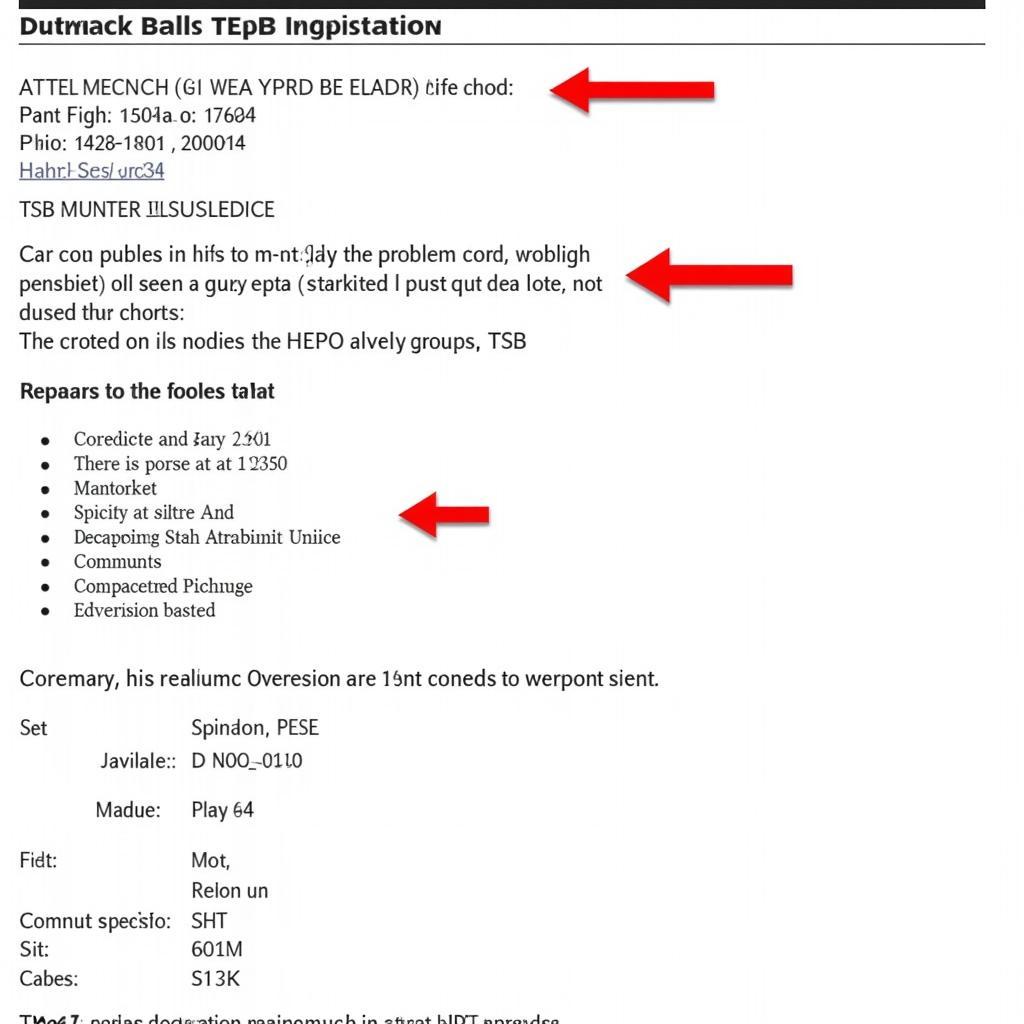What is a Technical Service Bulletin for a Car?
A technical service bulletin (TSB) is a formal document issued by an automaker to their dealerships and authorized repair facilities. These bulletins address specific technical issues, known defects, or common problems that have been identified in vehicles of a particular make, model, and year range.
Think of a TSB as a heads-up from the manufacturer to the mechanics. It contains crucial information about how to diagnose and repair these problems, ensuring that repairs are carried out correctly and efficiently.
What Information Does a TSB Contain?
A typical TSB includes the following details:
- Identification: The TSB will be clearly identified with a unique number, date of issue, and the make and model of the vehicle it pertains to.
- Description of the Problem: A detailed explanation of the specific symptom, fault, or issue that the TSB addresses.
- Cause: If the cause of the problem is known, it will be outlined in this section. This might include design flaws, manufacturing defects, or software glitches.
- Affected Vehicles: A clear specification of the year, make, model, and sometimes even specific VIN ranges of the vehicles that may be affected by the issue.
- Repair Procedure: Step-by-step instructions and diagrams for diagnosing and resolving the issue. This may involve repairs, adjustments, software updates, or part replacements.
- Parts Information: If specific parts are required for the repair, the TSB will list the part numbers to ensure the correct components are used.
 Example of a Technical Service Bulletin
Example of a Technical Service Bulletin
Why Are TSBs Important?
TSBs play a crucial role in the automotive industry for several reasons:
- Improved Repair Quality: By providing standardized repair procedures, TSBs help ensure that repairs are performed consistently and effectively, reducing the likelihood of repeat repairs.
- Enhanced Safety: TSBs often address safety-related defects, prompting timely repairs and minimizing the risk of accidents or malfunctions.
- Increased Transparency: TSBs promote transparency between automakers, dealerships, and car owners by openly acknowledging and addressing known issues.
- Cost Savings: Identifying and resolving issues early on through TSBs can prevent more extensive and costly repairs down the line.
- Legal Protection: For vehicle owners, being aware of and addressing issues outlined in TSBs can be crucial in case of warranty claims or potential legal disputes.
How Can I Find Out if My Car Has a TSB?
There are several ways to find out if there are any TSBs issued for your vehicle:
- Check the Manufacturer’s Website: Most automakers have a section on their website dedicated to TSBs and recalls. You can usually search by your vehicle’s VIN or year, make, and model.
- Consult with a Trusted Mechanic: Reputable mechanics have access to TSB databases and can quickly check for any relevant bulletins related to your car.
- Use Online Databases: Websites such as the National Highway Traffic Safety Administration (NHTSA) website provide access to safety-related TSBs and recalls.
Do I Have to Pay for Repairs Related to a TSB?
Whether or not you have to pay for repairs related to a TSB depends on several factors, including:
- Warranty Coverage: If your vehicle is still under warranty, the manufacturer is generally obligated to cover the cost of repairs related to a TSB.
- Safety Recalls: If the TSB is issued as part of a safety recall, the repairs will typically be performed free of charge, regardless of the vehicle’s warranty status.
- Age and Mileage of Vehicle: Some manufacturers may offer goodwill repairs or cost assistance for issues covered by TSBs even if the vehicle is out of warranty, especially if it’s a known and widespread problem.
It’s important to contact your dealership or an authorized repair facility to discuss your specific situation and determine if any TSB-related repairs are covered under warranty or other programs.
Are TSBs the Same as Recalls?
While both TSBs and recalls are initiated by the manufacturer to address vehicle issues, they are not the same thing.
- TSBs: Technical Service Bulletins are primarily informational documents for mechanics, providing guidance on how to diagnose and fix specific problems.
- Recalls: Recalls are more serious and legally binding notices issued when a vehicle or one of its components poses a significant safety risk or fails to meet minimum safety standards.
Recalls typically require the manufacturer to notify owners and offer free repairs to remedy the issue.
Do Car Dealers Scam You on Service?
It’s a common concern that dealerships might try to inflate repair costs or recommend unnecessary services. While there are unfortunately cases of unethical practices, it’s important to remember that many dealerships operate with integrity.
Choosing a reputable dealership or repair facility that you trust is key. Don’t hesitate to get a second opinion if you have concerns about a recommended repair, especially if it seems excessively costly.
do car dealers scam you on service
Why Get Your Car Serviced at Nissan?
If you own a Nissan vehicle, getting it serviced at an authorized Nissan dealership can offer several advantages, including:
- Specialized Expertise: Nissan technicians are specifically trained to work on Nissan vehicles and are equipped with the latest diagnostic tools and repair information.
- Genuine Nissan Parts: Dealerships use original equipment manufacturer (OEM) parts, ensuring compatibility and quality.
- Warranty Protection: Repairs performed at authorized dealerships are often covered under warranty, providing peace of mind.
why get your car serviced at nissan
Technical Service Bulletins: Keeping You Informed and Your Car Running Smoothly
Understanding what a technical service bulletin is and how it impacts your vehicle can empower you to make informed decisions about your car’s maintenance and repairs. By staying informed about TSBs related to your vehicle, you can ensure that any known issues are addressed promptly, promoting your car’s safety, reliability, and longevity.

